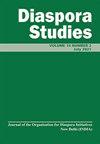Populist Diaspora Engagement
IF 0.5
Q4 DEMOGRAPHY
引用次数: 2
Abstract
How and why do right-wing populist parties engage in diaspora outreach? This article uses populism as a lens through to study diaspora engagement, and compares strategies used by right-wing parties in power (Turkey’s AKP and India’s BJP) to access their diasporas. While we find that polarising and civilisationist discourses are adopted in both cases for uniting the diaspora behind the populist in power, we argue that these strategies are implemented for different purposes. In the Turkish case, the promotion of Turkish and Sunni-Muslim identification serves the purpose of garnering electoral support behind the ruling party, while in the Indian case, identification with Hindutva is used to achieve the financial and developmental goals of the ruling party. By comparing outreach strategies through the analysis of policies and practices employed by the parties as well as the activities of their diasporic organisations, the article contributes to debates on party-led diaspora engagement.民粹主义侨民参与
右翼民粹主义政党是如何以及为何参与海外侨民外展活动的?本文以民粹主义为视角来研究侨民参与,并比较了右翼政党(土耳其的正义与发展党和印度的人民党)接触侨民的策略。虽然我们发现两极分化和文明主义话语在这两种情况下都被采用,以团结在掌权的民粹主义背后的侨民,但我们认为这些策略的实施目的不同。在土耳其的案例中,促进土耳其人和逊尼派-穆斯林的认同是为了获得执政党背后的选举支持,而在印度的案例中,对印度教的认同是为了实现执政党的财政和发展目标。本文通过分析各政党所采用的政策和实践,以及各散居侨民组织的活动,来比较各政党的外联策略,从而促进了有关政党主导的散居侨民参与的辩论。
本文章由计算机程序翻译,如有差异,请以英文原文为准。
求助全文
约1分钟内获得全文
求助全文
来源期刊

Diaspora Studies
DEMOGRAPHY-
CiteScore
1.40
自引率
10.00%
发文量
18
期刊介绍:
Diaspora Studies is the interdisciplinary journal of the Organisation for Diaspora Initiatives (ODI) and is dedicated to publishing academic research on traditional diasporas and international migrants from the perspective of international relations, economics, politics, identity and history. The journal focuses specifically on diasporas and migrants as resources for both home and host countries. The scope of the journal includes the role of diasporas and international migration as important drivers in international relations, in development, and within civil societies. The journal welcomes theoretical and empirical contributions on comparative diasporas and state engagement policies, and aims to further scholarship and debate on emerging global networks and transnational identities. Diaspora Studies publishes: 1. Reviewed research papers 2. Book reviews 3. Conference reports 4. Documents on diaspora policies
 求助内容:
求助内容: 应助结果提醒方式:
应助结果提醒方式:


